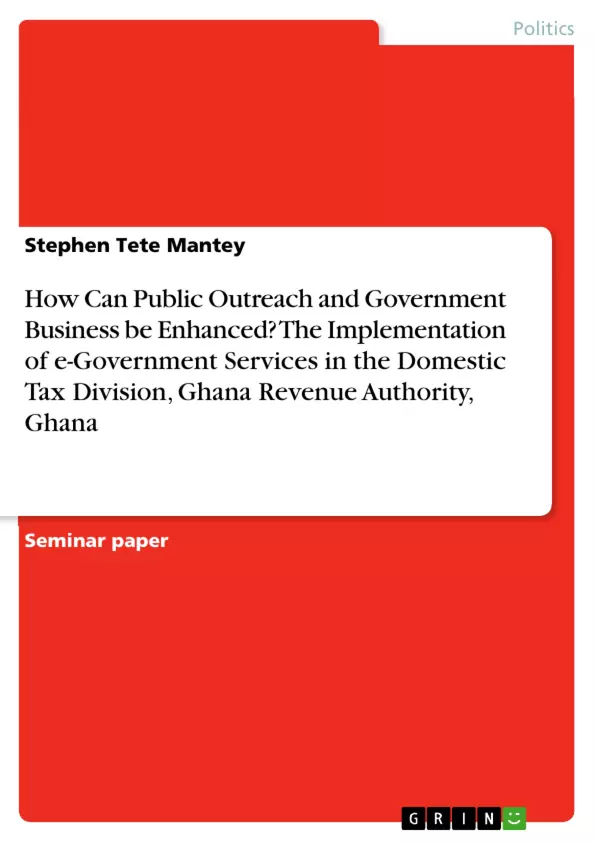The main objective of the study was to underscore the importance of public participation or outreach in implementation of e-government services. Within the course of this study, specific attention is paid to Ghana.
There is a compelling need for reforms within the public sector and this has continuously occupied government's policy frameworks all around the world because of the need to "get things right" through better policy improvement and implementation. Since the beginning of the financial crisis in 2008, governments have been devising ways to use information and communication technology (ICT) to enhance the performance of the public sector. The use of e-government services have been seen as an enabler in automating a broad range of government functions.
The study focused on the Domestic Tax Division of the Ghana Revenue Authority. The study relied on e-government theories, public policy theories, activities of the Ghana Revenue Authority in e-government service provision and the involvement of the public in their implementation. The study recognized that the Domestic Tax Division of the Ghana Revenue Authority, unlike other businesses, does not decide who they choose as their clients and are expected to serve everyone regardless of their background or where they are located.
The study concludes that agencies implementing e-government services have to consider that, a significant part of society lacks information on the use of e-government services and therefore must be involved in the participation process of e-government services of tax administration to help achieve better outcome.
Inhaltsverzeichnis (Table of Contents)
- ABSTRACT
- 1. INTRODUCTION
- 1.1 Background of The Study
- 1.2 Objective of the Study
- 1.3 Research Question
- 1.4 Organization of the Study
- 2. LITERATURE / THEORETICAL PERSPECTIVE
- 2.1 Introduction...
- 2.2 E-Government / Government to Citizens (G2C)
- 2.3 Background To E-Government Development in Ghana..
- 2.4 Public Engagement and E-Participation...........
- 2.5 Dimensions of the E-Government Environment..
- 3. CASE STUDY ORGANSIATION.
- 3.1 Summary Profile of the Domestic Tax Division: Ghana Revenue Authority..
- 4. DISCUSSION AND CONCLUSION..
- 4.1 Introduction.....
- 4.2 Participation and The Domestic Tax Division, Ghana Revenue Authority.
- 4.3 Policy Implementation: Socio-Economic Context..
- 4.4 Conclusion.
- REFERENCES
Zielsetzung und Themenschwerpunkte (Objectives and Key Themes)
This study aims to highlight the significance of public participation or outreach in the implementation of e-government services. It focuses on the Domestic Tax Division of the Ghana Revenue Authority as a case study to understand how citizen engagement can improve the effectiveness of e-government services.
- The importance of public participation in e-government service implementation
- The use of information and communication technology (ICT) to enhance public sector performance
- The role of e-government services in automating government functions
- The challenges and opportunities of e-government services in a developing country context
- The need for citizen-centered approaches to e-government service design and implementation
Zusammenfassung der Kapitel (Chapter Summaries)
The first chapter provides an overview of the study, outlining the background, objectives, research question, and organization of the study. It discusses the increasing need for public sector reforms and the growing use of e-government services to enhance efficiency and effectiveness. The chapter also explores the challenges associated with citizen engagement in e-government service implementation, particularly in developing countries.
Chapter two delves into the theoretical framework of e-government, including its historical development, key concepts, and different models of e-government service delivery. It examines the relationship between e-government and citizen participation, exploring various theories and frameworks that underpin public engagement in e-government initiatives. The chapter also discusses the dimensions of the e-government environment, highlighting factors that influence the success of e-government programs.
Chapter three presents a detailed profile of the Domestic Tax Division of the Ghana Revenue Authority, the case study organization for the study. It provides a summary of the division's structure, functions, and challenges in implementing e-government services. The chapter also discusses the specific context of Ghana in terms of e-government development and the socio-economic factors that influence the use of e-government services in the country.
Schlüsselwörter (Keywords)
The key keywords and focus topics of the study include public participation, e-government services, tax administration, Ghana Revenue Authority, citizen engagement, ICT, public sector reform, developing countries, and e-participation.
Frequently Asked Questions
What is the primary goal of the study on e-government in Ghana?
The study aims to emphasize the importance of public participation and outreach in the successful implementation of e-government services, specifically within the Ghana Revenue Authority.
How can ICT enhance public sector performance?
Information and Communication Technology (ICT) acts as an enabler to automate government functions, improve policy implementation, and increase efficiency in service delivery to citizens.
What challenges do developing countries face with e-government?
Challenges include a lack of information among the general public on how to use digital services, socio-economic barriers, and the need for inclusive participation processes.
What is the role of the Domestic Tax Division in this study?
The Domestic Tax Division of the Ghana Revenue Authority serves as a case study to analyze how tax administration can be improved through digital services and better citizen engagement.
What is G2C in the context of e-government?
G2C stands for Government-to-Citizens, referring to the digital interactions and service delivery models between a government and its residents.
- Citation du texte
- Stephen Tete Mantey (Auteur), 2020, How Can Public Outreach and Government Business be Enhanced? The Implementation of e-Government Services in the Domestic Tax Division, Ghana Revenue Authority, Ghana, Munich, GRIN Verlag, https://www.grin.com/document/514627



